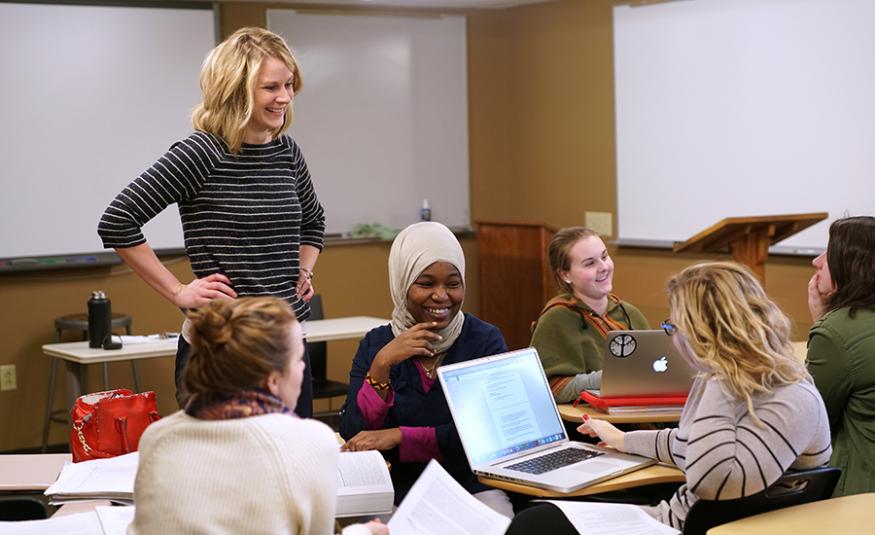
Five Questions: Dr. Jessica Schultz
Five Questions is a series of profiles of people at Augustana College. Contact sharenews@augustana.edu if you know someone you’d like to respond to five questions.
What are some challenges that you and your students face when discussing mental health issues in psychology classes?
One challenge we address is the 20-20 problem. About 20 percent of kids right now have a psychological disorder. The other part is that only 20 percent of those kids are getting treatment. It’s a very complex problem. Another challenge surrounds stigma. While the millennial generation has much less stigma than older generations, it’s still very present. That’s something we discuss in class: how stigma contributes to the 20-20 problem, how stigma is a big barrier for treatment, how it makes it hard to talk about these issues and how we fight stigma.
Many of us bring in friend- and family-related concerns or personal experience related to mental health. We talk about issues like suicide, depression, eating disorders and other tough topics. So creating a classroom environment that is a safe, intellectual space for students to dive in, safely and rigorously, is essential.
How do you prepare students to enter the real world?
First, I teach psychology as a scientific discipline, the study of human thought and behavior. I want students to read, understand and apply research. To have scientific literacy so when they ask questions, they know how to research and go about addressing those questions. Training students to conduct their own research and come up with their own studies is important.
We also focus on application of learning. A big part of my Child Psychopathology class is case studies. Students take an example and work in small groups to make a diagnosis, understand and identify what the contributing factors are and note some diagnoses they considered.
Students also participate in all sorts of internships and clinical experiences. Some work with school counselors, local community mental health centers, at the Scott County jail where they develop programming for inmates about healthy relationships and anger management, etc. We have awesome sites where students can sit in on group therapy and observe, so those are community relationships that we really try to foster. Mentors throughout the Quad Cities have been a huge help.
Our psychology majors go on to do all sorts of things. Some of them become psychologists or mental health therapists. Others go into research careers, child development, business management or advertising. Psychology has all sorts of applications.
Please describe the kind of student who does well in your classes.
Someone who is curious and willing to work hard. I certainly love fueling their curiosity and often remind my students that I’ll be working hard right alongside them. Successful students are those who are willing to do some application and consider what a topic may mean in their life, career and values.
What inspired your study of forgiveness as a psychologist?
I was raised in the Catholic Church, so I heard a lot about forgiveness through that part of my upbringing and it was always a really intriguing topic to me. At college, I started asking questions, talking to faculty about forgiveness, what they thought about it and how it worked. I did my senior capstone project on the topic, particularly related to sexual health. Then I continued this work in graduate school.
People often think that forgiveness is excusing something that happened or condoning it in some way. Not at all. Forgiveness isn’t condoning or excusing or saying that something’s okay. It’s reducing the feelings of anger and bitterness and adopting more of an empathetic, compassionate perspective on another person. We’re all faced with the opportunity to forgive, in big and small ways.
This summer, you will lead a two-day Augustana Summer Academy workshop for high school students called “The Psychology of Happiness.” What do you hope participants take away from this program?
I’ve talked about the psychology of happiness with a variety of different audiences. We’re naturally driven to think about happiness and living our best. For the high school students, I introduce the scientific study of happiness through a psychological lens—what it means, how we go about studying happiness and what actually makes us happy.
We start with a theoretical model from Martin Seligman, the PERMA Model, which suggests that happiness is comprised of positive emotions, engagement, rich relationships, meaning and accomplishment. Using the model, we talk through different aspects of well-being, because happiness isn’t just about feeling happy every day—it’s a long-term sense of fulfillment.
During this process, we cover experiential exercises and different research-based techniques. We also focus on big misconceptions and address ways that we pursue happiness in daily life.
By Rachel Reiter ’18, Augustana Writers Bureau
